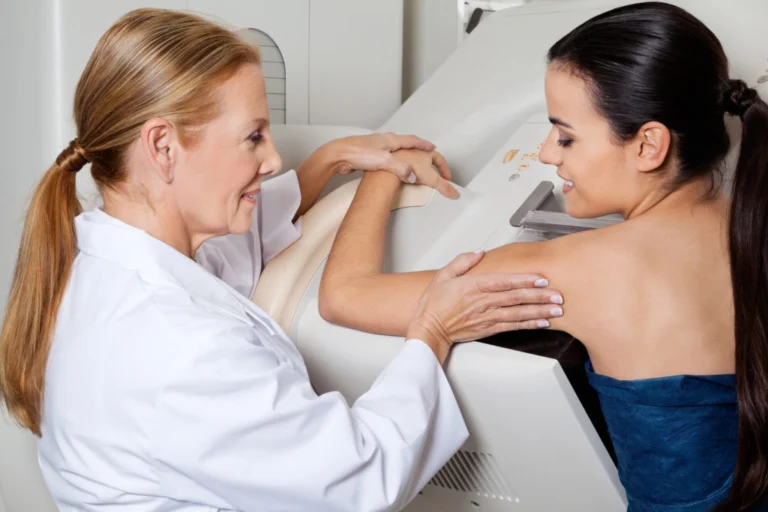A breast MRI (magnetic resonance imaging) scan is used for the detection and monitoring of breast cancer or breast abnormalities. It uses magnetic fields to capture detailed images of your breast tissue, without radiation. Your heart, lungs, and lymph nodes will also be visible in your results. Being told you need a breast MRI can be stressful, so keep reading to learn why your doctor may have requested this particular scan.
A breast MRI is most commonly used to detect the following:
- Abnormalities detected (but not diagnosed) by a mammogram
- Early signs of breast cancer (in women with a history of breast cancer or dense breast tissue)
- Breast cancer in women who have implants or scar tissue that might produce an inaccurate result from a mammogram
- Small abnormalities not visible with a mammogram or ultrasound
- Potential leakage from a silicone breast implant
- Borders and location of breast cancer lesions (for cancers that spread)
- Spread of breast cancer into the chest wall
- Breast cancer recurrence or residual tumor after lumpectomy
If you’ve gotten unclear results from a mammogram, your doctor may recommend a breast MRI in order to get more detailed results. There is no need to worry if your doctor recommends a breast MRI – it simply means they want to take a closer look at something on your scans. Some other reasons you may need a breast MRI could be:
- Leak or rupture of breast implant
- Family history of breast cancer (or ovarian cancer)
- Dense breast tissue
- Family history of precancerous breast changes (i.e. atypical hyperplasia or lobular carcinoma)
- Hereditary breast cancer gene change, such as BRCA1 or BRCA2
- You had radiation treatments to your chest area before age 30
What Are The Benefits Of A Breast MRI?
A breast MRI is the most accurate breast scan on the market right now. With a sensitivity of 77-96%, it is more accurate than ultrasounds or mammograms. While a mammogram’s results may show abnormalities, an MRI can show the location and borders of a mass or abnormality better. A breast MRI usually follows a breast biopsy that has revealed that the biopsied mass is cancer.
Although a breast MRI can detect a higher amount of cancers compared to mammograms, it could also result in a higher number of false positives. This is why most doctors recommend women stick with mammograms for their annual breast cancer screenings and save breast MRIs for when they might be more at risk for a breast cancer diagnosis. If your doctor has recommended a breast MRI over a mammogram for your annual breast cancer screening, this could be because of any of the reasons covered above. A breast MRI is also helpful in creating a course of treatment for breast cancer patients. The results can help determine whether a lumpectomy or mastectomy would be more effective, or whether the cancer has spread, which could affect the treatment plan.
Is It An Option For Women With Dense Breast Tissue?
For women with dense breast tissue, a breast MRI is a good option, but it is not the only option. You can get a 3D mammogram, which will give you a more detailed picture of your breasts. Ultrasound is another good option, but it is not a replacement for a mammogram. An MRI will give you more accurate results than even an ultrasound. An ultrasound can then give a better visualization of a mass in your breast that shows up on a breast MRI. It is important for your doctors to know the location and borders of a mass before coming up with a treatment plan.
Our radiologist will send your results to your doctor who will call you to discuss the results and answer any questions you may have. An abnormal breast MRI result could mean anything that does not look ordinary on your breast scans. If you see white spots on your breast MRI, don’t panic. These white spots could be dense tissue or a benign mass. Your doctor will need to run further tests like biopsies to test the spot and then will take you through your results and potentially create a treatment plan with you.
At South Jersey Radiology, you can trust that we will take every precaution to make you feel comfortable and prepared as you get scanned. You and your health are our top priority, so please don’t hesitate to ask questions or make requests. You can set up an appointment at any of the following locations where our dependable, courteous, and professional staff will be ready to perform your scan.
- Moorestown Office – Moorestown, NJ
- Mount Laurel Office – Mount Laurel, NJ
- Sewell (Washington Township) Office – Sewell, NJ
- Voorhees (Carnie Boulevard) Office – Voorhees Township, NJ
- Willingboro Office – Willingboro, NJ
- Women’s Center at Medford – Medford, NJ
- Women’s Center at Mount Laurel – Mount Laurel, NJ
- Women’s Center at Voorhees – Voorhees Township, NJ
Learn more about the board-certified, subspecialized radiologists who read and interpret studies at SJRA here.
Frequently Asked Questions
A breast MRI is typically recommended by your doctor for the detection and monitoring of breast cancer or breast abnormalities. It is particularly useful in cases where mammograms or ultrasounds have produced unclear results or when there are specific risk factors such as dense breast tissue, family history of breast or ovarian cancer, breast implants, or a history of radiation treatments to the chest area. A breast MRI provides more detailed images of breast tissue, including the location and borders of masses or abnormalities.
A breast MRI is most commonly used to detect abnormalities that have been identified but not diagnosed by a mammogram, early signs of breast cancer (especially in women with a history of breast cancer or dense breast tissue), breast cancer in women with implants or scar tissue that may affect mammogram accuracy, small abnormalities not visible with a mammogram or ultrasound, potential leakage from silicone breast implants, borders and location of breast cancer lesions (for cancers that have spread), the spread of breast cancer into the chest wall, and breast cancer recurrence or residual tumor after lumpectomy.
A breast MRI is currently the most accurate breast scan available, with a sensitivity of 77-96%, surpassing ultrasounds and mammograms in accuracy. It provides detailed information about the location and borders of masses or abnormalities. It is particularly helpful in creating an effective treatment plan for breast cancer patients, determining whether a lumpectomy or mastectomy is more appropriate, and assessing the spread of cancer. However, a breast MRI may also result in a higher number of false positives compared to mammograms, so it is typically recommended for women at higher risk or when other imaging methods have produced unclear results.
Yes, a breast MRI is a good option for women with dense breast tissue, but it is not the only option. Other options include 3D mammograms, which provide a more detailed picture of the breasts, and ultrasounds. However, an MRI generally offers more accurate results than an ultrasound. An ultrasound can provide better visualization of a mass detected on a breast MRI, aiding in determining its location and borders for treatment planning.
Our radiologist will send your results to your doctor who will call you to discuss the results and answer any questions you may have. An abnormal breast MRI result may indicate the presence of dense tissue or a benign mass, which may require additional tests such as biopsies for further evaluation.
South Jersey Radiology offers breast MRI services at several locations:
• Moorestown Office – Moorestown, NJ
• Mount Laurel Office – Mount Laurel, NJ
• Sewell (Washington Township) Office – Sewell, NJ
• Voorhees (Carnie Boulevard) Office – Voorhees Township, NJ
• Willingboro Office – Willingboro, NJ
• Women’s Center at Medford – Medford, NJ
• Women’s Center at Mount Laurel – Mount Laurel, NJ
• Women’s Center at Voorhees – Voorhees Township, NJ


